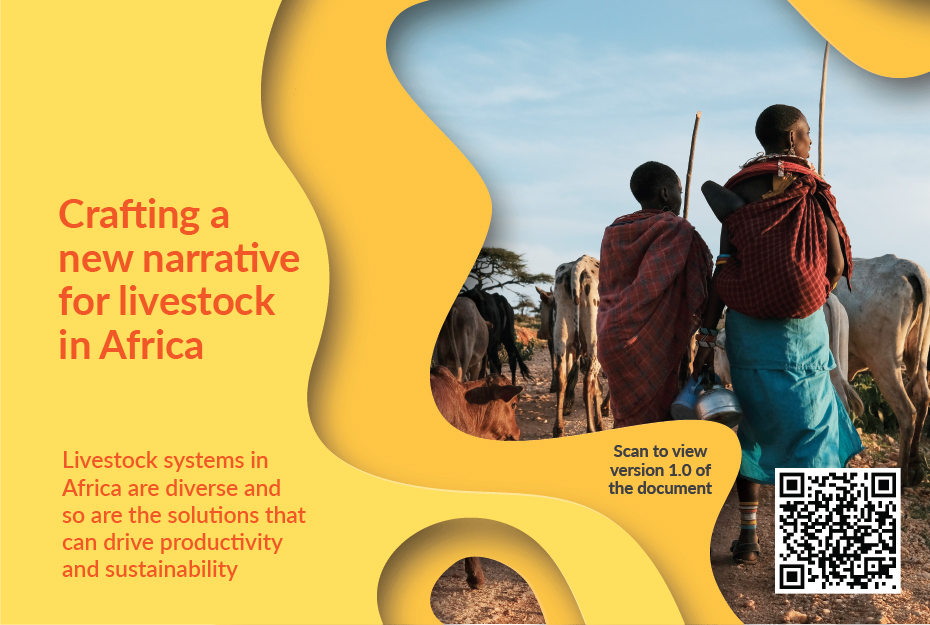
Creating a new livestock narrative for Africa: the role of resilience in livestock systems – 10 Dec
Core message
Event summary
A new African livestock narrative is essential because traditional perspectives fail to fully recognize the critical role of livestock in Africa's livelihoods, nutrition and its capacity for climate change adaptation.
At COP28, a session at the Resilience Hub in Dubai on 10 December brought together a range of experts - researchers, producers, development actors and policymakers - to discuss different perspectives around what constitutes the narrative of African livestock systems.
This session emphasized the unique story of African livestock, deeply integrated into the continent's socio-economic and cultural fabric, significantly different from narratives in other continents and income brackets.
The panel highlighted the need for A New African livestock narrative, one that acknowledges the overlooked but critical role of livestock in Africa’s livelihoods, nutrition and its capacity for climate change adaptation. In Africa, livestock is not just an economic asset – it is integral to food security, income, culture and, at times, survival. Across some countries in Africa, livestock contributes anywhere from 40 to 80% of GDP.
African livestock systems display incredible diversity, from mixed crop-livestock to pastoralism, each tailored to specific geographical and socio-cultural contexts. Challenges such as malnutrition, low income and climate-induced issues like heat stress on dairy production are prevalent, but there are viable solutions.
Improving productivity can address the challenges of poverty, malnutrition and climate effects while at the same time significantly reducing GHG emissions. Adopting culturally adapted scientific approaches, enhancing genetic resilience and integrating regenerative agricultural practices are key strategies. These solutions marry traditional knowledge with modern techniques, aiming for sustainability and resilience amidst ongoing climate challenges.
‘We need to tell our story – not others telling our story. We (at AGNES) are working with the International Livestock Research Institute and other partners to make sure that we have an African livestock narrative which our colleagues can be able to communicate and share widely, so that we are all in a position to convey and understand what livestock means in and for Africa.’ – George Wamukoya, AGNES

Key takeaways
- Livestock production is key for livelihoods, nutrition and climate adaptation in Africa, offering significant potential to achieve Sustainable Development Goals and fulfill the objectives of the African Union’s Agenda 2063.
- Researchers, policymakers, development actors and farmer and pastoralist groups agree on the urgent need to unlock resources for livestock in Africa and that can only happen if partners understand livestock in the context of the continent.
- It is essential that actions addressing livestock issues be informed by an understanding of their importance, the challenges faced, and viable solutions to these challenges.
- There is a strong call for the integration of culturally adapted science that supports both adaptation and mitigation efforts in relation to livestock.
- Improving productivity is an important way to address GHG right now.
- A range of best practices and solutions – such as improved livestock feed, better genetics, drought risk financing and anticipatory actions – are available and ready for scaling. Many of these practices embody regenerative and agro-ecological principles, merging traditional knowledge with modern know-how.
What panelists had to say
‘We must deliver the message on livestock in a way that connects with African people.’ – George Wamukoya, African Group of Negotiating Expert Support (AGNES)
--
‘Livestock is a big component of the agricultural GDP in Africa: livestock are livelihoods, bank accounts, cultural assets and insurance in difficult times.’ – Namukolo Covic, ILRI/CGIAR Regional Director for Eastern and Southern Africa
--
‘The significance of livestock in Africa is frequently misunderstood, particularly regarding its economic and socio-cultural value. Current calculation methods are flawed. They should not focus solely on the animal; instead, they need to illustrate how the animal is part of a system. This approach should highlight the integration and mutual value of people, animals, and land.’ – El Hadji Traoré, Institut Sénégalais de Recherches Agricoles
--
‘We have solutions, but don’t copy and paste them. African production systems are diverse and nuanced.’ Cargele Masso, CGIAR Biodiversity and Environment Impact Platform
--
‘Mobility and access are central for pastoralists. They have developed methods for managing rangelands, but these are increasingly being lost due to various challenges. The question arises: how can land rights and human rights be made central to this discussion? The right to manage and retain land is important for the sustainability of this production system.’ – Hussain Wario, Center for Research and Development in Drylands
--
‘Including young people in the transformation of the livestock sector is important. They have ideas, but need access to resources, finance and knowledge. Young pastoralists should have representation in global platforms like the COP to introduce pastoral communities to audiences. Being tech-savvy, full of ideas and energetic, they are well-equipped to combat the climate crisis in numerous ways. It's crucial to utilize their potential to implement these plans effectively.’ – Josephat Masanja, Africa Youth Pastoralist Initiative
Next steps
ILRI will continue working with AGNES, AU-IBAR and other partners to promote better understanding of livestock systems in Africa and their importance not only for addressing climate change challenges but also for supporting livelihoods, nutrition, ecosystem services and for their cultural significance in African communities.
